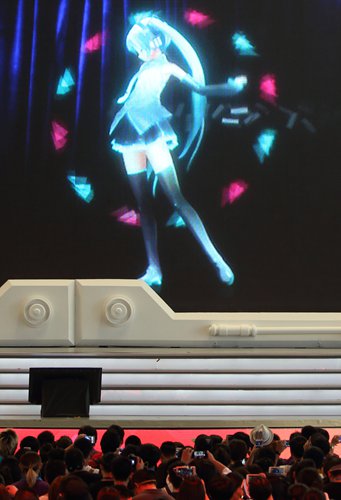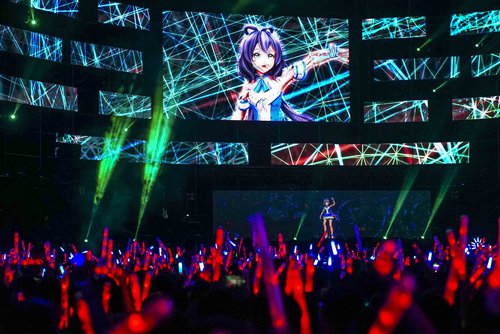HOME >> METRO SHANGHAI,BUSINESS
Vsinger idols are gaining popularity in Chinese market
By Huang Lanlan Source:Global Times Published: 2019/8/14 18:38:40
Virtual craze
At a small theater in Shanghai's Putuo district, dozens of young men and women wove green glow sticks to the rhythm, excitingly yelling the name of the girl on stage - Miku Hatsune, a 16-year-old singer.
It was just like any other ordinary concert consisting of a passionate performer, a group of enthusiastic spectators, music, applause and cheers. However, the biggest difference was that Miku is not a human, but a virtual singer (Vsinger) made from a combination of dynamic holographic 3D images and a synthesized voice.

'I was hooked'
Making her debut in 2007, Miku, a teenage persona with twin blue-green ponytails was being developed by a Japanese company, and has now become one of Asia's most popular virtual idols.
"I've flied to Tokyo twice only for her concerts," said Shanghai-based advertising copywriter Elsa, a Miku fan for over 10 years.
Elsa, now 30, was attracted to Miku after listening to her song for the first time in 2007. At that time, a Vsinger imitating a human's voice using a software synthesizer was still a novel concept. "I was hooked," Elsa recalled. "She's magic, being able to sing superhumanly high or low notes."
Although a Vsinger, Miku is no less popular than many real-life superstars. The cheapest tickets for her two concerts in Beijing last October were priced at 680 yuan ($96.3) each, and were sold out within 30 minutes, Beijing Business Today reported. This year, tickets at all prices for her two concerts in Guangzhou, South China's Guangdong Province, have been sold out months before they will take place in November.
In the Chinese market, Miku has her Putonghua-speaking competitors. Among dozens of China's local Vsingers, the most popular one is named Luo Tianyi, which was designed as a 15-year-old girl with long, grey hair.
Undoubtedly, lots of young Chinese like Tianyi. She has over 4.5 million followers on Sina Weibo, and the tickets for her July 2018 concert were sold out within minutes. Last month, her latest concert was livestreamed in Shanghai and attracted nearly 5 million viewers.
"I love her cute, round face, and her songs are so good," said 20-year-old university student Oriya. "Some may argue that a 'machine' without human emotions cannot sing well, but I don't think so because electronic music perfectly matches her voice," the Tianyi enthusiast said.

A-list star
Virtual idols - including Vsingers like Miku and Tianyi, Vtubers (virtual YouTubers) as well as popular anime, comic and game (ACG) characters - are common nowadays.
"To us millennials, chasing a virtual star is not at all awkward," said 26-year-old Xiyou (alias), who works at a subdistrict office in Shanghai.
Xiyou is among tens of thousands of fans of Ye Xiu, the protagonist of the e-sports novel The King's Avatar. In this novel, Ye is a professional e-gamer who was forced to retire on top and then tried to make a comeback. "He is cool, humorous, responsible and persistent," Xiyou told the Global Times. "I've never met anyone with so many attractive personalities in real life."
Ye is one of China's A-list virtual idols, ranking at the top in a domestic ACG character popularity competition in 2017 with over 160,000 votes. On May 29, Ye's "birthday" with the hashtag #YeXiuHappyBirthday won 590 million views, surpassing the views of the marriage of celebrity couple Yu Xiaoguang and Choo Ja-hyun on the same day.
China Literature, one of China's largest online publishing and e-book companies that owns intellectual property of The King's Avatar, said that Ye's success is attributed to both the company's and enthusiasts' joint efforts. "For years we've organized Ye's online and offline birthday celebrations and invited his fans to participate," said a manager at China Literature.
Thanks to the development of new technologies including virtual reality (VR) and augmented reality (AR), virtual idols and their human lovers have never been closer to each other. "We've tried high-tech based activities like interactive concerts and 3D-image fan parties to bring participants better experiences," the manager told the Global Times.
In January, Ye's holographic image had a talk show with actor Chen Kun at a China Literature's event, sparking heated discussion online. "That's fantastic," a Ye's fan wrote on Weibo. "I feel that the wall between virtual and real worlds no longer exists."

Commercial value
With growing popularity, virtual stars' commercial values are becoming gradually apparent in the Chinese market. From sodas to skincare products, more and more brands tend to invite virtual idols to be their spokespersons.
Ye, for instance, has become a spokesman for several brands including Mirinda, Rexona and McDonald's. "Ye's net worth has surpassed 1 billion yuan," National Business Daily reported in July.
China Literature is confident in Ye's business performance. "As a virtual idol, he has a longer lifespan (than human idols), and he is free of negative news," its manager said. "We believe he has greater commercial potential in the future."
Fans are indeed willing to pay for their stars. Yan Xiao, a 30-something financial industry staffer and a The King's Avatar lover, told the Global Times she has spent more than 10,000 yuan in supporting Ye and Yu Wenzhou (another character in this novel), by participating in their off-line events and buying products they've endorsed.
Miku's fan Elsa has spent much more. She owns over 100 Miku albums as well as numerous dolls, posters and badges, which have cost her nearly 100,000 yuan in total. "There's one thing similar between chasing a virtual star and a real one," she laughed. "Spending money on him or her."
It was just like any other ordinary concert consisting of a passionate performer, a group of enthusiastic spectators, music, applause and cheers. However, the biggest difference was that Miku is not a human, but a virtual singer (Vsinger) made from a combination of dynamic holographic 3D images and a synthesized voice.

Miku Hatsune Photo: VCG
'I was hooked'
Making her debut in 2007, Miku, a teenage persona with twin blue-green ponytails was being developed by a Japanese company, and has now become one of Asia's most popular virtual idols.
"I've flied to Tokyo twice only for her concerts," said Shanghai-based advertising copywriter Elsa, a Miku fan for over 10 years.
Elsa, now 30, was attracted to Miku after listening to her song for the first time in 2007. At that time, a Vsinger imitating a human's voice using a software synthesizer was still a novel concept. "I was hooked," Elsa recalled. "She's magic, being able to sing superhumanly high or low notes."
Although a Vsinger, Miku is no less popular than many real-life superstars. The cheapest tickets for her two concerts in Beijing last October were priced at 680 yuan ($96.3) each, and were sold out within 30 minutes, Beijing Business Today reported. This year, tickets at all prices for her two concerts in Guangzhou, South China's Guangdong Province, have been sold out months before they will take place in November.
In the Chinese market, Miku has her Putonghua-speaking competitors. Among dozens of China's local Vsingers, the most popular one is named Luo Tianyi, which was designed as a 15-year-old girl with long, grey hair.
Undoubtedly, lots of young Chinese like Tianyi. She has over 4.5 million followers on Sina Weibo, and the tickets for her July 2018 concert were sold out within minutes. Last month, her latest concert was livestreamed in Shanghai and attracted nearly 5 million viewers.
"I love her cute, round face, and her songs are so good," said 20-year-old university student Oriya. "Some may argue that a 'machine' without human emotions cannot sing well, but I don't think so because electronic music perfectly matches her voice," the Tianyi enthusiast said.

Luo Tianyi at a concert in Shanghai Photo: VCG
A-list star
Virtual idols - including Vsingers like Miku and Tianyi, Vtubers (virtual YouTubers) as well as popular anime, comic and game (ACG) characters - are common nowadays.
"To us millennials, chasing a virtual star is not at all awkward," said 26-year-old Xiyou (alias), who works at a subdistrict office in Shanghai.
Xiyou is among tens of thousands of fans of Ye Xiu, the protagonist of the e-sports novel The King's Avatar. In this novel, Ye is a professional e-gamer who was forced to retire on top and then tried to make a comeback. "He is cool, humorous, responsible and persistent," Xiyou told the Global Times. "I've never met anyone with so many attractive personalities in real life."
Ye is one of China's A-list virtual idols, ranking at the top in a domestic ACG character popularity competition in 2017 with over 160,000 votes. On May 29, Ye's "birthday" with the hashtag #YeXiuHappyBirthday won 590 million views, surpassing the views of the marriage of celebrity couple Yu Xiaoguang and Choo Ja-hyun on the same day.
China Literature, one of China's largest online publishing and e-book companies that owns intellectual property of The King's Avatar, said that Ye's success is attributed to both the company's and enthusiasts' joint efforts. "For years we've organized Ye's online and offline birthday celebrations and invited his fans to participate," said a manager at China Literature.
Thanks to the development of new technologies including virtual reality (VR) and augmented reality (AR), virtual idols and their human lovers have never been closer to each other. "We've tried high-tech based activities like interactive concerts and 3D-image fan parties to bring participants better experiences," the manager told the Global Times.
In January, Ye's holographic image had a talk show with actor Chen Kun at a China Literature's event, sparking heated discussion online. "That's fantastic," a Ye's fan wrote on Weibo. "I feel that the wall between virtual and real worlds no longer exists."

Ye Xiu Photo: IC
Commercial value
With growing popularity, virtual stars' commercial values are becoming gradually apparent in the Chinese market. From sodas to skincare products, more and more brands tend to invite virtual idols to be their spokespersons.
Ye, for instance, has become a spokesman for several brands including Mirinda, Rexona and McDonald's. "Ye's net worth has surpassed 1 billion yuan," National Business Daily reported in July.
China Literature is confident in Ye's business performance. "As a virtual idol, he has a longer lifespan (than human idols), and he is free of negative news," its manager said. "We believe he has greater commercial potential in the future."
Fans are indeed willing to pay for their stars. Yan Xiao, a 30-something financial industry staffer and a The King's Avatar lover, told the Global Times she has spent more than 10,000 yuan in supporting Ye and Yu Wenzhou (another character in this novel), by participating in their off-line events and buying products they've endorsed.
Miku's fan Elsa has spent much more. She owns over 100 Miku albums as well as numerous dolls, posters and badges, which have cost her nearly 100,000 yuan in total. "There's one thing similar between chasing a virtual star and a real one," she laughed. "Spending money on him or her."
Posted in: METRO SHANGHAI,BIZ FOCUS